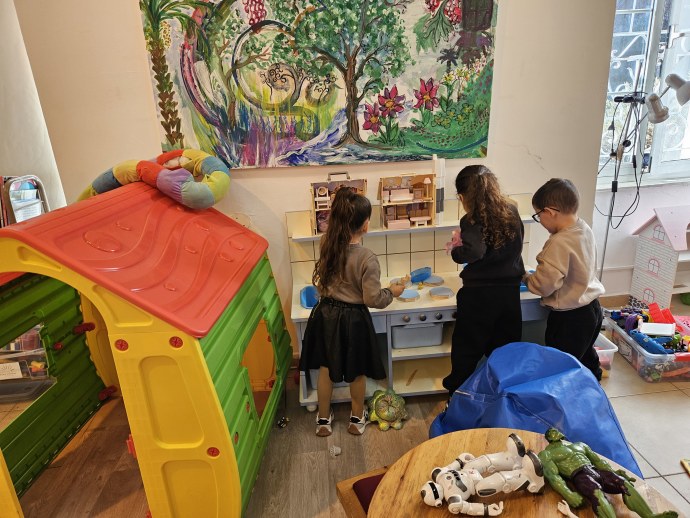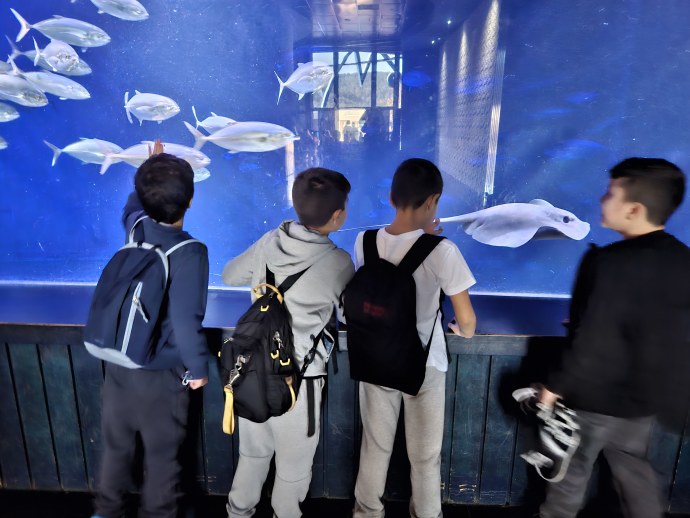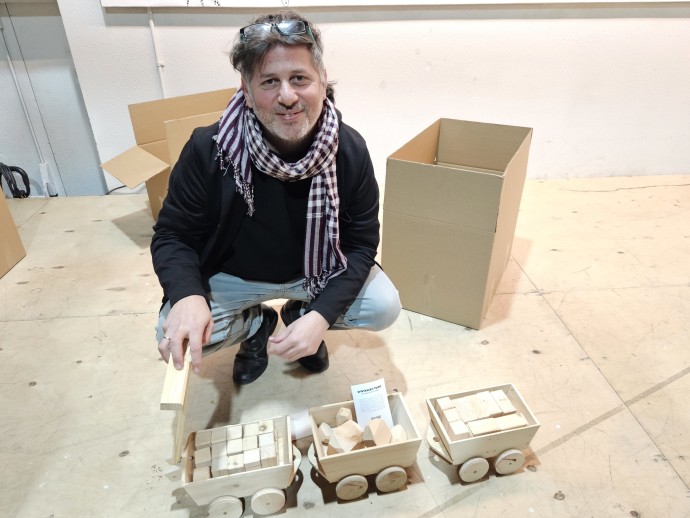While IDF troops are fighting in Gaza, and the skirmishes with Hezbollah increase on Israel’s northern border, the effects of the war are being felt throughout the country.
Tens of thousands of evacuees from Israel’s northern and southern communities have been displaced, and the economic effects of the war, accompanied by the almost total cessation of tourism, have been considerable.
Almost immediately after the tragic events of Oct. 7, the Jerusalem Foundation (JF)) created an emergency fund to deal with the effects of the war in Jerusalem.

Since its founding in 1966, JF has invested more than $1.5 billion in promoting economic growth; education, dialogue, arts, and culture; and heritage preservation in the city. “Within the first days of the war, we realized that the situation had quickly changed,” says Ruth Diskin, chief programming officer of the Foundation.
Festivals and conferences in Jerusalem scheduled for after Sukkot were canceled.
By October 11, just four days after the Hamas attacks on Israel’s South, evacuees from Israel’s northern and southern communities had begun to arrive in Jerusalem.
JF pivoted to this new reality
“We had to provide an emergency response,” says Diskin.

As well, JF wanted to “continue to help the evacuees who were being hosted in Jerusalem and also to assist the various cultural, sports, and leisure institutions in the city to enable them to host evacuees, initiate activities, continue to create, and not have to send their workers on unpaid leave.”
Diskin and Shai Doron, president of the JF, dubbed the emergency assistance project “Double Impact.”
The most immediate impact provided through the emergency fund has been on hosting and providing assistance for evacuees and others in need in Jerusalem.
The second level of impact from this assistance has been on organizations in Jerusalem, which have benefited from the many visits of these evacuees, which enable them to keep functioning.
“The children are crammed into hotel rooms with their parents – in one room – and everyone needs to get out of the space. We can provide them with all that Jerusalem has to offer – the Zoo, the Aquarium, the Jerusalem Theatre, the Khan Theatre, the Science Museum, and the Botanical Gardens.
“That has been the second part of our impact. All these institutions are struggling.
“Few tourists are coming to Israel; by bringing the evacuees [to visit them], we are helping to support these institutions,” Doron explains.
The emergency fund created by the Jerusalem Foundation is designed to support community organizations and agencies across Jerusalem, focusing on those most affected by the war: the city’s most vulnerable residents, even more at risk in this challenging time; Jerusalem families of the bereaved and the wounded; essential workers in the city; and evacuees currently residing in the city.

As of the end of 2023, the JF had raised $8 million from its generous donors worldwide, enabling it to assist tens of thousands of people throughout the city. Prominent among the donors to this fund have been the US-based Gottesman Fund; the Christians for Israel organization in the Netherlands; and Marcus Margulies, a longtime supporter of the Foundation, based in England. Citing precise figures, Diskin says that to date, the programs created through the emergency fund have assisted more than 51,000 people in the city, including the many thousands of evacuees temporarily residing in Jerusalem.
Elaborating on the theme, Diskin explains that many of the evacuees from Israel’s North and South who were sent to Jerusalem are largely unfamiliar with Jerusalem’s attractions beyond places like the Western Wall and the Knesset. Since November, the Jerusalem Foundation has arranged for evacuees to visit such attractions as the Tisch Family Biblical Zoo, the Gottesman Family Israel Aquarium, and the Train Theatre in Liberty Bell Park, as well as other cultural and music centers.
“The effect of this double impact,” says Diskin, “was to enable us to host and give the evacuees a break and a way to learn more about Jerusalem; and also to provide schools in Jerusalem with cultural activities during the period immediately after the war started when there were no formal studies.”
Beyond the educational field trips offered to evacuees, the Jerusalem Foundation’s emergency fund has provided funds to 23 schools in the city – both permanent and temporary – providing books, equipment, and necessary school supplies since the beginning of the war.
The emergency fund has also aided Jerusalem community centers; increased staff in shelters for battered women; assisted in the distribution of food baskets and medicine to vulnerable populations through SAHI, an organization that empowers at-risk youth; provided activities for the elderly and Holocaust survivors; and supported Jerusalem Food Rescuers, an organization that saves tons of discarded produce each week.
THE MAGAZINE accompanied Diskin and Doron on a sunny Jerusalem morning to visit three of the projects that have benefited from the emergency fund. The three stops were a teachers’ institute that has been converted into a school; a Jerusalem attraction that has been hosting thousands of evacuees from the North and the South; and a theater that has become a toy factory catering to the displaced children in Jerusalem.
The first stop was Machon Kerem, a teacher training institute on Harav Avida Street in central Jerusalem.
In addition to its teacher training activities, the building currently houses a school composed of 60 students, most from the evacuated northern town of Shlomi. A smaller contingent of students from Kfar Maimon, in Israel’s South, attend the school from kindergarten through sixth grade. The children in the kindergarten are from Shlomi and Kiryat Shmona. According to the temporary kindergarten teacher, Keren, from Kfar Maimon, all the children are getting along well.
“Kids are kids,” she smiles.
Keren says that the Shlomi residents wanted to keep the town’s children together in one school, making the evacuee experience easier to bear. And while Machon Kerem, with its winding stairways and narrow halls was not exactly designed to house elementary school students, the familiar school-day sounds of the children in the halls attest to the success of the students and teachers doing the best job they can under the circumstances..
Doron relates, “The emergency fund of the Jerusalem Foundation was able to provide an immediate response to for needs of the educational system in Jerusalem, beginning on October 8, when the country and the municipality could not meet the needs quickly enough.
“We had to do two things – provide an immediate response for the students studying in schools like this, or hotel-based schools, and to help the schools in Jerusalem that took in evacuees as part of the student body. There is a huge list of needs, and the costs are great.”
Schools that had just been formed needed chairs, backpacks, and books for the students, and the staff had to be paid until the Education Ministry could take over.
Keren adds that one positive thing that has emerged from the evacuees’ educational experiences in Jerusalem has been the children’s exposure to places and subjects they might otherwise not be familiar with. “It has been an opportunity for the people from the periphery.”
The students develop a closer relationship with Jerusalem; and the cultural experiences, such as the Bloomfield Science Museum, are life-changing.
Our second stop is the Gottesman Family Israel Aquarium (Israel’s first aquarium), adjacent to the Biblical Zoo.
We meet there with 120 children from Sderot who are staying at the Jerusalem Gates Hotel. Their squeals of excitement punctuate the air as they watch the varied species of fish in the large viewing areas and learn about the underwater world.
One of the teachers accompanying the group tells the Magazine, “This is the third time we have brought them here, and they were so excited that they were ready half an hour early!”
Since the evacuees arrived in Jerusalem, 7,000 students have visited the Israel Aquarium, and 5,000 have visited the Biblical Zoo. These tours are entertaining, educational, and a breath of fresh air for young people spending most of their time in cramped hotel rooms.
Our final destination is the HaZira Performance Art Arena, an interdisciplinary theater in Talpiot, on the site of the former Rav Chen movie theatre. HaZira is a small repertory theater that stages original performances throughout the year and has been a beneficiary of the Jerusalem Foundation.
When the war broke out on Oct. 7, the theater closed and performances were canceled. The theater’s staff adapted their skills to the war effort. They began to recycle old theater sets to build toys for the children from Israel’s North and South staying at hotels in Jerusalem.
A team of 10 designers began to hand-design wooden toys such as sturdy wooden blocks, and memory games with unique designs on individual squares.
This has had a double impact on the city: JF’s support for the theater enabled artists who were out of work due to its closure to remain employed, while at the same time providing entertainment and diversion for the evacuees staying in Jerusalem hotels.
Faithful to its name, the Jerusalem Foundation is using its emergency fund and its staff’s ingenuity to meet the needs of the city and continues to serve Israel’s capital not only in more peaceful times.
